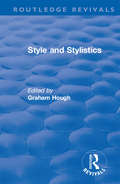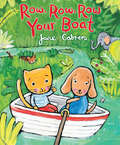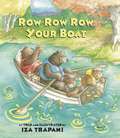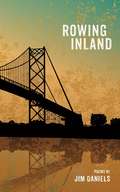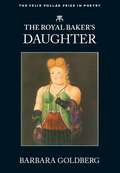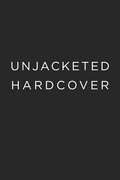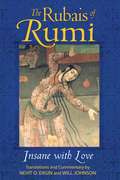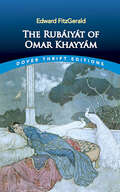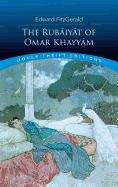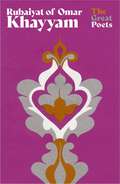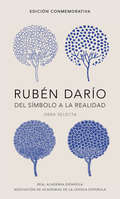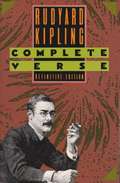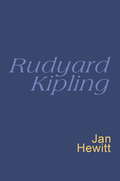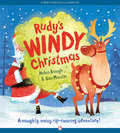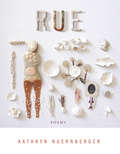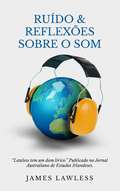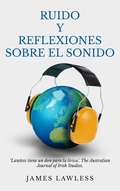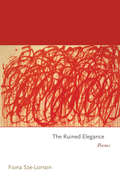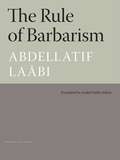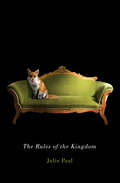- Table View
- List View
Routledge Revivals: Style and Stylistics (Routledge Revivals)
by Graham HoughFirst published in 1969, Professor Hough’s work examines stylistics – the bridge between linguistics and literary criticism. The book gives a short survey of stylistics from a literary point of view, and tries to answer the question of how much stylistics contributes to the understanding of literature. It brings together continental European work on stylistics and Anglo-American critical writing which has a similar purpose though usually under a different name. In calling the attention of the student of literature to trains of thought with which he is not generally familiar, and with detailed analysis on different literary styles and methods, Professor Hough provides important critical insights.
Row, Row, Row Your Boat (Jane Cabrera's Story Time)
by Jane CabreraRead, row, and roar along - a newly imagined favorite will have everyone singing.In this vibrantly-painted rain forest, squeak, bark, and chatter along with a kitten and puppy rowing their way down the stream. Uncover one delightful animal surprise after another. Sheet music with guitar chords, along with Cabrera's jaunty new verses, is included.Jane Cabrera's Story Time celebrates children's best-loved read along nursery rhymes and songs. These interactive favorites are given a new twist by award-winning artist Jane Cabrera and feature her bold, bright, kid-friendly illustrations. Don't miss the other delightful nursery-rhyme titles, including Here We Go Round the Mulberry Bush, If You're Happy and You Know It, and One, Two, Buckle My Shoe.
Row Row Row Your Boat (Iza Trapani's Extended Nursery Rhymes)
by Iza TrapaniClimb aboard, read, and sing along with this adorable family of bumbling bears as they row, row, row their boat on a merry adventure in this beloved, reimagined nursery rhyme. Hold on to your hats and get ready to laugh as these irresistible characters rock, bash, and splash their way into your heart. Iza Trapani brings a fresh spin to this classic song with new verses and sweet and vibrant illustrations. Young readers will recognize the song and delight in seeing it come to life as the bears paddle their way through the pages.
Rowing Inland (Made in Michigan Writers Series)
by Jim DanielsRowing Inland, Jim Daniels’s fifteenth book of poetry is a time machine that takes the reader back to the Metro Detroit of his youth and then accelerates toward the future. With humor and empathy, the author looks at his own family’s challenges and those of the surrounding community where the legacy handed down from generation to generation is one of survival. The economic hits that this community has to endure create both an uncertainty about its future and a determined tenacity. Divided into four sections, Rowing Inland calls out key moments from the author’s life. The events that inspire many of these poems took place a long time ago and often it has taken the poet his entire life to write about those experiences and write about them with the necessary emotional distance. For example, some of the poems in the section “Late Invocation for Magic” reference the first girl he ever kissed and her accidental death by fire. In the last section of the book, Daniels approaches the current political and social standings in Detroit with lines like, “The distance to Baghdad or Kandahar / is measured in rowboat coffins / while here in the fatty palm of The Mitten / minor skirmishes electrify tedium.” Although it focuses on Detroit’s metropolitan area, the book can be considered a snapshot of working-class life anywhere across the country. Daniels casts his lens on a way of life that is often distorted or ignored by the powers that be. He zooms in on street level where all the houses may look alike but each holds its own secrets and dreams. To paraphrase novelist and screenwriter Richard Price, Detroit is the “zip code for [Daniels’s] heart”—a place that his writing will always come back to. Readers of contemporary poetry with a regional persuasion will enjoy this collection.
Roy Campbell: Selected Poems
by Roy Campbell Joseph PearceA collection of Roy Campbell's works selected by Joseph Pearce.
The Royal Baker's Daughter
by Barbara GoldbergWinner of the 2008 Felix Pollak Prize in Poetry, selected by David St. John These poems, at once elegant and earthy, reveal the inner workings of the human psyche and show us that sometimes the best defense against terror is making mischief. The Royal Baker's Daughterwas raised on a diet of stone soup and the occasional leftover royal treat. This leaves her with an appetite for authenticity. With nothing but her two deft hands to guide her, she embarks on a journey into the dark forest, "where sticks and stones and absolutes reign and nothing, even sin, is original. " Best Fall book from theMontserrat Review
R's Boat
by Lisa RobertsonThe boldly original Canadian poet Lisa Robertson has received high praise for the uncompromising intelligence and style of her poetry. In R's Boat, she brings us to the crossroads of poetry, theory, the body, and cultural criticism, where the quotidian and the metaphysical marry and invert.
The Rubais of Rumi: Insane with Love
by Nevit O. Ergin Will JohnsonThe first English translation of the rubais of Rumi • Presents 233 of the most evocative of Rumi’s 1,700 rubais • Shows that the mystical embrace is the way to directly experience the Divine Rumi is well known for the over 44,000 verses that appear in a 23-volume collection called the Divan-i Kebir. Yet Rumi also composed 1,700 rubais, short aphorisms and observations, whose depth and message belie their brevity. The form of rubais first became well known through the 11th-century collection The Rubaiyat of Omar Khayyam. But unlike Khayyam, who like most poets would sit and carefully craft each word, Rumi would compose and speak his poems through the spontaneous “language of poetry” that poured from his lips as he traveled the streets of Konya, Anatolia (present-day Turkey). Very few of Rumi’s rubais have been translated into any of the languages of the contemporary Western world. Now, Nevit O. Ergin, the translator of the complete Divan-i Kebir, and Will Johnson present here 233 of the most evocative of Rumi’s 1,700 rubais.Rumi’s poetry expresses profound and complex truths in beautiful yet simple language. He reveals that by going deep into the interior of our heart and soul, we can arrive at a place in which we once again merge and connect with the divine. This mystical quest, Rumi contends, is the birthright of us all. Anything less than a complete dissolving into the world of divine union will not provide the satisfaction and peace that we all seek. The simple, yet profound spiritual truths and visions contained in The Rubais of Rumi lead the way to the path of reconnection to the direct energies of God.
The Rubáiyát of Omar Khayyám: First and Fifth Editions (Dover Thrift Editions)
by Edward FitzGeraldOmar Khayyám (1048–1122) was a Persian mathematician, astronomer, and a philosopher who was not known as a poet in his lifetime. Later, a body of quatrains became attached to his name, although not all were his works. These verses lay in obscurity until 1859, when Edward FitzGerald (1809–1883), an English country gentleman, published a free adaptation of this Persian poetry. After its discovery by D. G. Rossetti and others, the verse became extremely popular. Essentially a hedonist and a skeptic, Omar Khayyám, through FitzGerald, spoke with both an earthy and spiritual freedom that stirred a universal response. As a result, the Rubáiyát became one of the best-known and most often quoted English classics. The fifth edition, published posthumously in 1889, was based on FitzGerald's handwritten changes in a copy of the fourth edition, and is traditionally printed with the first edition.
The Rubáiyát of Omar Khayyám
by Edward Fitzgerald Omar KhayyamEdward Fitzgerald's free translation of skeptical, hedonistic verse attributed to Omar Khayyám (1048-1122), Persian mathematician, astronomer, and philosopher.
Rubaiyat of Omar Khayyam: Rendered Into English Quatrains By E. , Fitzgerald. A Reprint In Full Of The First Edition, 1859, Of The Second Edition, 1868, And Of The Fifth Edition, 1889, Together With Notes Indicating The Minor Variants [found In The T (The Great Poets)
by Omar KhayyamThe best-loved, bestselling poem ever published, brought up to date with a sumptuous new look.Edward FitzGerald's much-loved, often-quoted, bestselling 1859 translation of the RUBAIYAT, with Attar's charming narrative poem, BIRD PARLIAMENT. Also featuring an extensive new introduction with notes and chronology.Awake! for Morning in the Bowl of NightHas flung the Stone that put the Stars to Flight:And Lo! the Hunter of the East has caughtThe Sultan's Turret in a Noose of Light.
Rubaiyat of Omar Khayyam (The Great Poets)
by Omar KhayyamThe best-loved, bestselling poem ever published, brought up to date with a sumptuous new look.Edward FitzGerald's much-loved, often-quoted, bestselling 1859 translation of the RUBAIYAT, with Attar's charming narrative poem, BIRD PARLIAMENT. Also featuring an extensive new introduction with notes and chronology.Awake! for Morning in the Bowl of NightHas flung the Stone that put the Stars to Flight:And Lo! the Hunter of the East has caughtThe Sultan's Turret in a Noose of Light.
Rubén Darío, del símbolo a la realidad (Edición conmemorativa de la RAE y la ASALE)
by Rubén DaríoNueva edición conmemorativa de la Real Academia Española y la Asociación de Academias de la Lengua Española para celebrar el centenario del fallecimiento de Rubén Darío, uno de los escritores hispanohablantes más importantes del siglo XX. Publicada con ocasión de la celebración del VII Congreso de la Lengua Española en Puerto Rico. Rubén Darío es uno de los escritores en lengua española más populares a ambos lados del océano Atlántico. Su poesía y su narrativa constituyen uno de los principales exponentes del movimiento modernista. Sin embargo, la dimensión literaria de Rubén Darío desborda el ámbito de la ficción. Su labor como corresponsal, llevada a cabo durante gran parte de su vida, propició la escritura de interesantes crónicas en las que el autor ofrece una inteligente visión de su realidad. La presente antología incluye los textos íntegros de los poemarios Prosas profanas y otros poemas y Cantos de vida y esperanza. Los cisnes y otros poemas, y el libro de crónicas Tierras solares, que recoge las publicadas para el diario argentino La Nación sobre su tercera visita a España (1904) y las escritas durante su viaje por Bélgica, Alemania, Austria-Hungría e Italia en el mismo año. La edición presenta estudios complementarios escritos por algunos de los principales críticos, escritores y académicos españoles e hispanoamericanos, además de un glosario, un índice de nombres propios y una bibliografía selecta sobre la obra de Darío. ------------ Ediciones conmemorativas de la Real Academia Española y la Asociación de Academias de la Lengua Española En 2004 y coincidiendo con la celebración del IV Centenario de la publicación de la primera parte de Don Quijote de la Mancha, la Real Academia Española y la Asociación de Academias de laLengua Española dieron inicio a un proyecto de edición de grandes obras de la literatura en español. Concebida como una línea de ediciones conmemorativas ocasionales y de circulación limitada de los grandes clásicos hispanos de todos los tiempos, dichas obras son publicadas y distribuidas en todo el mundo de habla hispana. Rubén Darío. Del símbolo a la realidad se une ahora a esta colección de la que ya forman parte Don Quijote de la Macha, de Miguel de Cervantes, reeditada en 2015 con ocasión del IV centenario de Cervantes; Cien años de soledad de Gabriel García Márquez; La región más transparente, de Carlos Fuentes; Antología general , de Pablo Neruda; Gabriela Mistral en verso y prosa, una antología de la autora; La ciudad y los perros de Mario Vargas Llosa y La colmena, de Camilo José Cela. ------------
Rudyard Kipling: The Complete Verse
by Rudyard KiplingAll of Kipling's well-known and well-loved poems like "Gunga Din" and "If" are here like old friends. So are the poems from all of his books and all previous collections. His most hated poems, his most imperialist and racist are here for anyone looking for an excuse to hate him. But here too are a number of truly great, insightful poems; many in the form of dramatic personae, which make it easy to understand why TS Eliot one of the greatest of modern poets, found so much to praise that he anthologized some of what he considered some of Kipling's best, adding his voice to the growing chorus demanding a reevaluation of his place in the history of British and world poetry.
Rudyard Kipling: Everyman's Poetry (Everyman Poetry Ser. #No. 45)
by Rudyard Kipling Jan HewittIncludes the ever popular "If", along with the best of Kipling's powerful, fluent poetry.
Rudyard Kipling: Everyman Poetry
by Rudyard KiplingIncludes the ever popular "If", along with the best of Kipling's powerful, fluent poetry.
Rudy's Windy Christmas
by Helen Baugh Ben MantleWhile Santa and Mrs. Claus eat their dinner, Santa sneakily feeds his sprouts to one of the reindeer rather than eating them himself. The result is, uh, smelly, to say the least. Now, Rudy can't seem to stop releasing windy pops from his backside as he and the other reindeer help Santa deliver presents on Christmas Eve. The rest of the reindeer are downwind from Rudy and they are not handling the sprouty wiffs so well. They laugh so heartily at Rudy's rear-end trumpet that they simply cannot fly the sleigh as usual. It's up to Rudy's super-turbo gas to get them back to the North Pole.
Rue (American Poets Continuum #176)
by Kathryn NuernbergerIn this fiercely feminist ecopoetic collection, Kathryn Nuernberger reclaims love and resilience in an age of cruelty. As the speaker—an artist and intellectual—finds herself living through a rocky marriage in conservative rural Missouri, she maintains her sense of identity by studying the science and folklore of plants historically used for birth control. Her ethnobotanical portraits of common herbs like Queen Anne’s lace and pennyroyal are interwoven with lyric biographies of pioneering women ecologists whose stories have been left untold in textbooks. With equal parts righteous fury and tender wisdom, Rue reassesses the past and recontextualizes the present to tell a story about breaking down, breaking through, and breaking into an honest, authentic expression of self.
Ruído & Reflexões sobre o Som
by James Lawless Patrícia PintoUma pequena história e um longo poema que abordam o problema do ruído na sociedade. O que é o ruído? O que acontece quando ele permanece na sua cabeça? Na sua hilariante história, marcada com Reflexões piegas sobre o Ruído, o Sr. James Lawless revela-lhe, de uma forma típica bem humorada, alguns dos efeitos dos sons, na sociedade contemporânea, seguido pelo seu poema O Ruído, ascendentemente pesado, que explora o que a devastação descontrolada cacofónica provoca a indivíduais sensíveis.
Ruido y Reflexiones sobre el Sonido
by James Lawless Rocío García Romero¿Qué es el ruido? ¿Qué sucede cuando se mete dentro de la cabeza? En esta divertida historia marcada por el patetismo de unas Reflexiones sobre el Sonido, James Lawless retrata con su peculiar humor algunos de los efectos del sonido en la sociedad actual, seguido del decadente poema Ruido, cuyos versos incansables exploran la devastación que produce en las personas sensibles una cacofonía fuera de control.
The Ruined Elegance: Poems
by Fiona Sze-LorrainIn her new collection, Fiona Sze-Lorrain offers a nuanced yet dynamic vision of humanity marked by perils, surprises, and the transcendence of a "ruined elegance." Through an intercultural journey that traces lives, encounters, exiles, and memories from France, America, and Asia, the poet explores a rich array of historical and literary allusions to European masters, Asian sources, and American influences. With candor and humor, each lyrical foray is sensitive to silence and experience: "I want to honor / the invisible. I'll use the fog to see white peaches." There are haunting narratives from a World War II concentration camp, the Stalinist Terror, and a persecuted Tibet during the Cultural Revolution. There are also poems that take as their point of departure writings, paintings, sketches, photographs, and music by Gu Cheng, Giorgio Caproni, Bonnard, Hiroshige, Gao Xingjian, Kertész, and Debussy, among others. Grounded in the sensual, these poems probe existential questionings through inspirations from nature and the impermanent earth. Described by the Los Angeles Review of Books as "a high lyricist who refuses to resort to mere lyricism in order to articulate her experience," Sze-Lorrain renews her faith in music and poetic language by addressing the opposing aesthetics of "ruins" and "elegance," and how the experience of both defies judgment.
The Rule of Barbarism: Pirogue Poets Series
by Abdellatif Laabi Andre Naffis-SahelyFinally available in English, Le Règne de la barbarie by Abdellatif Laâbi is one of the most daring poetic visions of the second half of the twentieth century. First published in 1976 when Laabi was serving an eight-year prison sentence (1972-1980) for 'crimes of opinion' against the Moroccan State, The Rule of Barbarism is a devastating flight through consciousness, acquainting the reader with the trials of a society caught between a colonial past and the tragic realities of a brutal dictatorship. Analysing the presence of 'barbarism' inherent in all of us, and yet deepening our capacity for compassion despite the allure of revenge, this stunning debut from a writer on the threshold of a groundbreaking career can be read as an epic of love, empathy, anger and despair--and is as resonant today as when composed nearly fifty years ago.
Rules of the Kingdom
by Julie PaulA lapsed religion still emits / faint signals; God, / in his satellite dish, / groans / moving on. To seek belonging, to strain against the familiar – these are the polarities many of us live between, feeling the pull of each desire. Offering a particular history, an intimate vantage point from within the various kingdoms we inhabit, Julie Paul’s The Rules of the Kingdom is an exploration of this struggle on a personal level and a universal one. Broken into five sections, the book examines the human struggle to find meaning, comfort, and a sense of home. In “Settlers’ Descendant Reclaims the Past,” the poems consider rural life, both the specific and the collective, including a village’s destruction by fire. In “Weight of the Word” the focus turns to family of origin, religion, and rites of passage. Poems take a familial tack again in “Cleavage,” wherein Paul dives into the waters of motherhood, and they drift into further intimacy in “The World’s Smallest Republic,” a series of poems about sex, love, and marriage. Finally, the poems in the fifth section, “Next Time the World Will Burn,” explore our place in the twenty-first century and offer some idiosyncratic suggestions on how to live. At turns humorous, playful, contemplative, and coy, the poems in The Rules of the Kingdom question the vagaries of faith and family but ultimately celebrate life and love.
Rules of the Kingdom (Hugh MacLennan Poetry Series #39)
by Julie PaulA lapsed religion still emits / faint signals; God, / in his satellite dish, / groans / moving on. To seek belonging, to strain against the familiar – these are the polarities many of us live between, feeling the pull of each desire. Offering a particular history, an intimate vantage point from within the various kingdoms we inhabit, Julie Paul’s The Rules of the Kingdom is an exploration of this struggle on a personal level and a universal one. Broken into five sections, the book examines the human struggle to find meaning, comfort, and a sense of home. In “Settlers’ Descendant Reclaims the Past,” the poems consider rural life, both the specific and the collective, including a village’s destruction by fire. In “Weight of the Word” the focus turns to family of origin, religion, and rites of passage. Poems take a familial tack again in “Cleavage,” wherein Paul dives into the waters of motherhood, and they drift into further intimacy in “The World’s Smallest Republic,” a series of poems about sex, love, and marriage. Finally, the poems in the fifth section, “Next Time the World Will Burn,” explore our place in the twenty-first century and offer some idiosyncratic suggestions on how to live. At turns humorous, playful, contemplative, and coy, the poems in The Rules of the Kingdom question the vagaries of faith and family but ultimately celebrate life and love.
